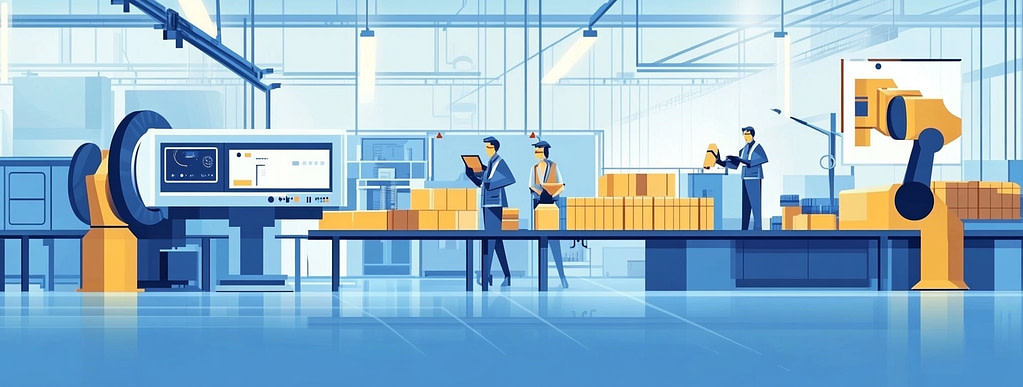How AI is Helping Small Businesses Compete with the Big Dogs

Artificial intelligence (AI) is here to stay and small businesses are loving it. AI gives access to solutions that were once reserved for large businesses only. It has unlocked a new world of opportunity filled with automation, machine learning and fast computing. This reduces the reliance on human abilities and large budgets. So, using AI small businesses can compete with larger corporations.
Let’s take you on a journey to explore how a small business can really hone into AI. Small businesses can adopt it to rise above competitors. How? Let’s find out.
What’s The Hype About?
AI is not just for high-tech businesses. It is making waves in all business domains, across business divisions. Whether it’s just the humble GPT-4 or tailored niche-specific solutions, every business is testing AI to some degree. AI can be trained to simulate human thinking. This is why a lot of businesses are dedicating resources to training their own AI instances. Others are experimenting with out-of-the-box tools to see what sticks. AI has seeped into marketing efforts, finance and accounting, operations and product development.

AI is able to work on tasks that need visual perception, speech recognition, and critical decision making. These systems rely on algorithms and data to process information. They are then able to compute predictions or recommendations.
AI plays a key role in increasing efficiency, productivity, speed and accuracy. All of these elements are vital for small businesses to compete with giants. AI can do this through automating repetitive tasks. The pairing of AI and automation is truly transformative. It reduces the need for human effort, saves time, finances and energy.
AI: A Bandwagon or Holy Grail?
AI has become an integral part of many businesses, from startups to large enterprises. Its applications are diverse and span across various industries. So, yes it is much more than just a trend. The proof of that lies in the widespread AI experimentation happening worldwide. Industries pushing hard on AI include retail, healthcare, finance, manufacturing and creative services. Businesses of all shapes and sizes are interested in it.
Here are some ways AI is transforming landscape for small business owners:
- Automation: AI-powered bots and robotic process automation (RPA) can handle routine tasks. The two main benefits of that are reducing human error and freeing up employees for higher-value work.
- Data analysis: AI algorithms can analyze vast amounts of structured and unstructured data. They can extract valuable insights and trends that inform business strategies in minutes.
- Predictive analytics: AI can predict customer behavior, market trends, and demand patterns. Using these analytics businesses can make data-driven decisions and anticipate future needs.
- Personalization: AI algorithms can use customer data to deliver personalized recommendations. That can improve customer loyalty and experience. Businesses can set up automations on behavioral triggers that improve the lifetime value of the customer.
But the impact of AI goes beyond just these applications.
For instance, in the healthcare industry, AI is being used to develop diagnostic tools. These tools can detect diseases with higher accuracy and speed. This not only improves results but also reduces healthcare costs. Other industries are also investing in AI to develop unique use-cases.
AI-powered robots are revolutionizing production lines by increasing efficiency and precision. For the manufacturing industry this is great. These robots can perform complex tasks with minimal human intervention. This means a lesser dependency on labor leading to higher productivity and quality control.

Is It Driving Any Real Impact On Small Businesses Though?
Traditionally, small businesses face resource challenges when competing with larger corporations. AI simulates human intelligence. The landscape is changing through out-of-the-box solutions and free tools. It is thus able to support small business with human-captial-like abilities. AI levels the playing field by providing access to technologies that were once only exclusive to large companies. Small businesses can now stay agile, responsive, and competitive.
With the advent of AI, small businesses are experiencing revolutionary optimization of operations. AI-powered automation has the capability to handle mundane and time-consuming tasks. Data entry, inventory management, and bookkeeping, for example are all automatable. Gone are the days of manual data entry, desk-ridden work and the risk of human errors. Small businesses can now rely on AI to ensure improved efficiency and cost savings.
But that’s not all. AI is also transforming optimizing supply chains, forecasting demand, and managing inventory levels. By harnessing the power of AI, small businesses can meet customer demands proactively. They can maintain optimal stock levels and prevent both overstocking and stockouts. This level of precision ensures that small businesses can operate smoothly without hiccups. It also eliminates the fear of losing customers due to inadequate inventory management.
By automating these essential processes, small businesses can allocate their resources more strategically. AI can support them in the capacity of a virtual assistant as well. It also helps them make more time for work that moves the needle.

Leveling the Playing Field
AI is a powerhouse that helps small businesses to gain a competitive edge in the market. Traditionally, small businesses have faced tough competion with larger corporations. Mostly, due to limited resources and manpower. However, AI levels the playing field.
Before AI such technologies and tools were exclusive to large companies. Larger corporations used their research budgets to stay on top of the market. With AI, small businesses can make informed business decisions. The can leverage analytics to understand and respond to the market better.
They can utilize predictive analytics to anticipate customer demands, for example. Through AI-powered tools, small businesses can stay agile and responsive. That is vital in a fast, competitive business landscape.
AI-Driven Strategies for Business Growth
AI can also help small businesses develop effective strategies for growth. AI algorithms can identify untapped opportunities and potential target markets. This enables data-driven decisions regarding expansion, new products, markets, or segments. AI can also help identify operational inefficiencies, optimize strategies, and improve marketing campaigns. AI insights can help maximize the chance of success for small firms.
Popular Applications For Small Businesses:
- AI can ideate and offer a great starting point for marketing campaigns, growth strategies and solving problems
- AI Chatbots can reduce the need for human input from employees
- Businesses that engage with diverse audiences can use AI to translate
- AI can help with content generation and repurposing
- Businesses can leverage AI to automate inventory management, sales intake and order fulfillment
- It can analyze large datasets rather quickly. Businesses can make informed data-driven decisions based on these analytics
- AI workflows can provide customers a personalized experience based on their behavior
- It can free up time and bandwidth of employees and business owners. This can help businesses focus on the creation of value rather than administrative tasks
All of these together can reduce their reliance on using budgets to grow business and capture market share.

Preparing Your Business for an AI-Driven Future
To rise in an AI-driven future, small businesses need to develop a proactive mindset. They must embrace technological advancements. This means staying informed on emerging AI solutions. It also means to engage with thought leaders and continuously test new solutions.
Building a data-driven culture within the organization is vital for success. Small businesses can do so by emphasizing the importance of competitive AI practices.

AI, is changing what small businesses can achieve. It’s helping them do things more easily, make their customers happier, and grow bigger. Think of AI as a smart assistant that you can shape, train and give as much responsibility as you please. That too without the risk of burn out, fatigue or turnover.